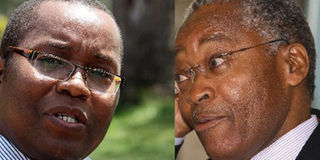NCIC on the spot over Mwakwere summons

The National Cohesion and Integration Commission (NCIC) chairman Mzalendo Kibunjia (left) and Environment minister Chirau Ali Mwakwere (right). NCIC was put on the spot August 9, 2012 for failing to summon Mr Mwakwere to appear in court to answer charges of hate speech. FILE
The National Cohesion and Integration Commission (NCIC) was put on the spot Thursday for failing to serve Environment minister Chirau Ali Mwakwere with summons to appear in court to answer charges of hate speech.
Principal magistrate Lucy Nyambura did not take kindly the reasons why the minister was not in court and wondered how the investigating officers from the NCIC could claim that they had discussed the summons with Mr Mwakwere over the phone and that he agreed to honour the summons.
“It is the duty of the investigating officers to properly serve the suspect when summons are issued. You cannot allow an accused person to dictate to you when he is to appear in court,” said the magistrate.
The court procedures provide that summons are served to an individual physically. In some instances where a person cannot be reached, the courts allow to be served through a notice in the newspapers.
Properly served
The Director of Public Prosecutions, through principal state counsel Lillian Obuo, told the court that although the investigating officers from the NCIC communicated with the minister over the phone, they had not served him physically.
The prosecutor claimed that the minister has been elusive and that under the circumstances they were seeking for more time to serve the warrant.
She said Mr Mwakwere had called the investigating officers and confirmed that he would come to court to answer the charges.
Ms Nyambura directed that the matter be mentioned on Monday next week to confirm whether the minister has been properly served and that the minister should present himself on August 15 to take plea.
The minister’s summons to appear in court was issued by principal magistrate Peter Ndwiga on Tuesday following an application by investigating officers from the Muthaiga Police Station.
The decision to have the minister charged was taken by the DPP Keriako Tobiko soon after Justice David Majanja dismissed a petition in which the minister sought to stop his arrest and prosecution.
Mr Mwakere was scheduled to appear before the magistrate after he lost a second attempt to temporarily block his prosecution over allegations of propagating hate speech.
He filed an urgent application on Wednesday but Lady Justice Florence Muchemi declined to give an order stopping the police from arresting the Matuga MP, only certifying the application as urgent and directing that it be heard on Wednesday next week.
Step aside
Mr Mwakwere was seeking to stop the Director of Public Prosecution and the police from arresting him until an appeal he has filed against the decision to prosecute him is heard and determined.
He claims that if he is charged with the alleged offence, he shall be required to step aside from the office of Cabinet Minister for Environment in compliance with Chapter Six of the Constitution that is now a matter of political practice.
Mr Mwakwere has maintained that he is innocent, and that the intended prosecution is not only unfair but also discriminatory in that a Mombasa court had ruled that the Mombasa Republican Council has a constitutional right to agitate about the same historical grievances he was agitating for and which he is being accused of as hate speech.
He claims that the matters which he is alleged to have uttered have been the subject of public and open debate regarding the marginalisation and historical injustices perpetrated against the people at the coast who suffer from decades of denial of access to their rights.
In the event that the minister is charged next week, he will be expected to leave his Cabinet position and can only be reinstated after being cleared by the court.
The NCIC complained to the DPP that Mr Mwakwere engaged in hate speech during campaigns for the Matuga by-elections in 2010. He is alleged to have told voters that indigenous Coast residents were being oppressed by Kenyans of Arab descent.




